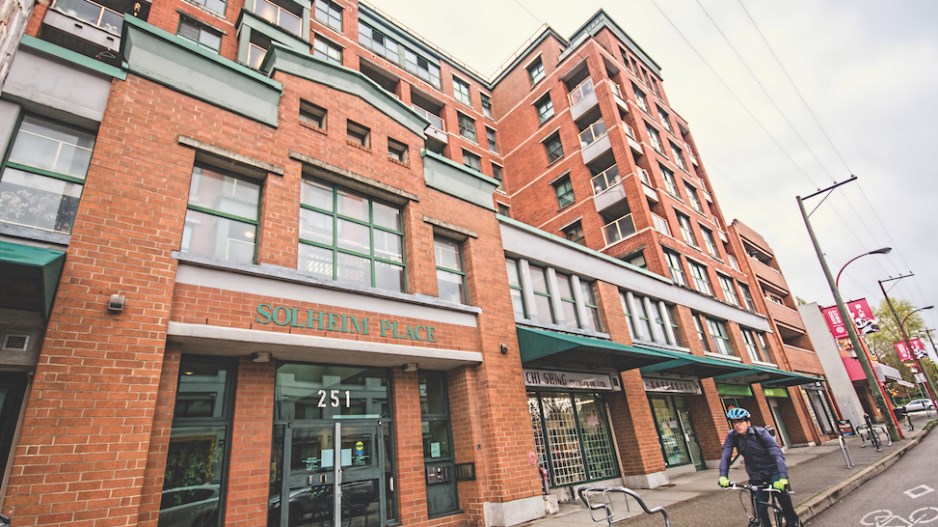of tenants living in a social-housing complex in Vancouver’s Chinatown is refocusing public attention on the non-profit sector’s challenges in trying to serve a market overwhelmed by demand.
Earlier this month, a group of protesters representing 73 tenants in the nine-storey Solheim Place took to the streets to protest over the state of the building’s main elevator, which has been broken since last September, forcing many seniors living on the sixth floor or above to crawl up and down the stairs to leave or enter the building.
Nick Yung of the Vancouver Tenants Union said Solheim Place, which is owned by BC Housing and managed by Vancouver non-profit organization SUCCESS, has another, smaller elevator that services the first five floors. That elevator, too, has been plagued by mechanical problems and is operating intermittently.
While tenants formally reached out to SUCCESS in February to demand action, Yung said they were upset when officials told them early this month it may take up to an additional 11 months for a new main elevator to be installed.
Yung said SUCCESS officials offered no compensation to tenants at that time, which triggered the protest.
“The night before the protest, they did release a compensation plan, but it was fairly insulting,” Yung said. “According to their letter, it was 10% rent relief for tenants on the sixth floor and above, while fifth-to-second-floor tenants get 5%. But this is welfare-rate social housing, which means a lot of tenants are paying $300 to $400 in monthly rent. So 10% is only $40, and 5% is only $20; that’s not even enough for groceries.”
Yung added that two senior women who lived on or above the sixth floor died during the elevator outage, although it is unclear whether the service disruption played any role in the deaths.
Queenie Choo, SUCCESS’ CEO, said the organization has been aware of Solheim’s elevator issues but noted capital items such as the elevator required BC Housing’s approval for repair or replacement. That means the repair has to follow that agency’s rules, which takes time, she said.
Choo added that the 11-month estimate for repairs was a worst-case scenario given to them by elevator repair consultants, and SUCCESS was focused on being transparent in relaying the message to Solheim residents.
“We are as anxious and upset as the tenants are,” Choo said. “But we are not responsible for the replacement of capital items, and we want to work with BC Housing to address the risk. As the building’s operator, we rely on BC Housing to give us the support.”
SUCCESS officials said they have increased services by adding tenant support staff on site to help and have offered to relocate those who want to move to other accommodations offered by SUCCESS while Solheim’s elevator is being repaired.
Meanwhile, a statement from the provincial Ministry of Municipal Affairs and Housing confirmed that SUCCESS recommended “short-term maintenance and a complete modernization of both elevators” as early as November 2015, and the short-term maintenance was finished in 2016.
“Based on the report recommendation, BC Housing was scheduled to reassess both elevators in 2019 to determine if modernization was due. Unfortunately, in September 2018, one of the elevators broke down, before BC Housing’s scheduled evaluation.”
On April 17, BC Housing and SUCCESS officials met with Solheim tenants and confirmed a new, full-time social worker will be on site starting April 23 to assist with residents moving up or down the stairs, as well as any relocation requests. BC Housing also said it will prioritize Solheim residents’ requests to move, although officials noted the number of alternative housing units to which residents can be moved is limited.
Officials told tenants that the elevators at Solheim may still take 11 months to replace, but may be be repaired in the short term and return to operational status in three months.
Yung, however, said tenants remain furious at SUCCESS and that BC Housing’s ownership of Solheim did not absolve the Vancouver non-profit of blame.
He added that many residents have lived in Solheim for decades and do not want to move.
Other non-profits involved in senior and Chinese community social housing in Chinatown and the Downtown Eastside said they are also facing repair and maintenance issues, although few are on the scale described by Solheim’s tenants.
Chanel Ly, co-ordinator for the Yarrow Intergenerational Society for Justice, which helps provide services and housing for Chinese-Canadian seniors in the neighbourhood, said many seniors either lack the resources to pay for for-profit senior home space or prefer the dignity of living independently. That made Solheim Place a good compromise that was sorely needed for local seniors prior to the elevator outage.
Jenny Konkin, co-founder of the Whole Way House Society, which runs support programs for 85 seniors living in Veteran Manor on the Downtown Eastside, said the neighbourhood’s lack of adequate seniors’ social housing is obvious to non-profit industry observers.
“The demand is huge,” Konkin said. “We are seeing an increase in seniors’ homelessness every year. In the most recent homelessness count, it showed that 21% of our homeless population in Metro Vancouver are seniors, which is very scary. That number has more than doubled in the last 10 years, compared to 9% in 2008.”
Ly added that provincial and municipal officials are starting to take notice of the housing shortage and the challenges faced by facilities in the sector serving Chinatown seniors.
But most of the real estate development projects in the neighbourhood do not include adequate amounts of social housing for seniors, and the various non-profit groups serving Chinatown and the Downtown Eastside are often siloed and fractured, meaning segments like the Chinese-speaking senior population tend to slip through the cracks of government funding support. •




